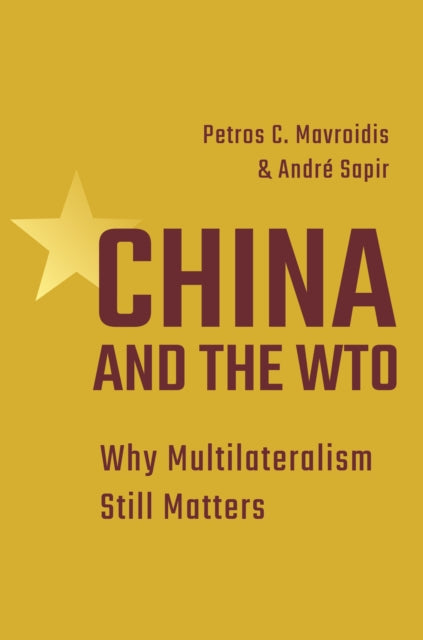Petros C. Mavroidis,Professor Andre Sapir
China and the WTO: Why Multilateralism Still Matters
China and the WTO: Why Multilateralism Still Matters
YOU SAVE £6.68
- Condition: Brand new
- UK Delivery times: Usually arrives within 2 - 3 working days
- UK Shipping: Fee starts at £2.39. Subject to product weight & dimension
Bulk ordering. Want 15 or more copies? Get a personalised quote and bigger discounts. Learn more about bulk orders.
Couldn't load pickup availability
- More about China and the WTO: Why Multilateralism Still Matters
China's participation in the World Trade Organization (WTO) has been complex, causing conflicts with some trading partners. Petros Mavroidis and André Sapir argue that the WTO needs to reform to accommodate China's unique geopolitical position and address issues such as state-owned enterprises' unfair trade advantages and forced technology transfer. The book offers fresh ideas for lasting solutions in a global trade dispute era.
\n Format: Hardback
\n Length: 264 pages
\n Publication date: 05 January 2021
\n Publisher: Princeton University Press
\n
China's participation in the World Trade Organization (WTO) has been a complex and contentious issue since its accession in 2001. While the WTO was intended to promote international trade and cooperation, China's economic model and size have posed challenges to the organization's ability to mitigate tensions and conflicts. This essay examines China's participation in the WTO, the conflicts it has caused, and the potential for WTO reforms to ease these tensions.
China's accession to the WTO was seen as a significant milestone in global trade relations, as it promised to open up the Chinese market to foreign investment and trade. However, the process of China's integration into the WTO has been marked by tensions and conflicts with its trading partners, particularly the United States.
One of the main sources of conflict between China and the WTO is the issue of state-owned enterprises (SOEs). SOEs in China enjoy a range of unfair trade advantages, such as preferential access to government subsidies, capital, and resources. This has led to concerns that SOEs are distorting the Chinese market and competing unfairly with private and foreign companies.
Another issue of concern is China's domestic policies and regulations that impose forced technology transfer on foreign companies as a condition for accessing the Chinese market. This has been criticized as a barrier to foreign investment and innovation, and has led to disputes between China and its trading partners.
To address these issues, Petros Mavroidis and André Sapir propose a range of WTO reforms. They argue that the WTO needs to translate some of its implicit principles into explicit treaty language to better accommodate China's unique geopolitical position. Specifically, they suggest that the WTO should revise its rules on state-owned enterprises to ensure that they are treated equally with private and foreign companies. They also propose that the WTO should establish a mechanism to monitor and enforce domestic policies and regulations that impose forced technology transfer on foreign companies.
In addition, Mavroidis and Sapir suggest that the WTO should strengthen its dispute resolution mechanisms to ensure that disputes are resolved quickly and effectively. This could involve the establishment of an independent panel to hear disputes and make recommendations for resolution, as well as the use of binding arbitration to settle disputes.
Overall, China and the WTO offers a timely exploration of the unprecedented challenges posed by China's participation in the global trade system. While unilateral pressure from the United States and other trading partners is not the answer, the WTO can enact judicious reforms to induce China's cooperation and restore confidence in the WTO system. By translating some of its implicit principles into explicit treaty language and strengthening its dispute resolution mechanisms, the WTO can better accommodate China's unique geopolitical position and promote international trade and cooperation.
\n Weight: 556g\n
Dimension: 245 x 166 x 29 (mm)\n
ISBN-13: 9780691206592\n \n
This item can be found in:
UK and International shipping information
UK and International shipping information
UK Delivery and returns information:
- Delivery within 2 - 3 days when ordering in the UK.
- Shipping fee for UK customers from £2.39. Fully tracked shipping service available.
- Returns policy: Return within 30 days of receipt for full refund.
International deliveries:
Shulph Ink now ships to Australia, Belgium, Canada, France, Germany, Ireland, Italy, India, Luxembourg Saudi Arabia, Singapore, Spain, Netherlands, New Zealand, United Arab Emirates, United States of America.
- Delivery times: within 5 - 10 days for international orders.
- Shipping fee: charges vary for overseas orders. Only tracked services are available for most international orders. Some countries have untracked shipping options.
- Customs charges: If ordering to addresses outside the United Kingdom, you may or may not incur additional customs and duties fees during local delivery.


